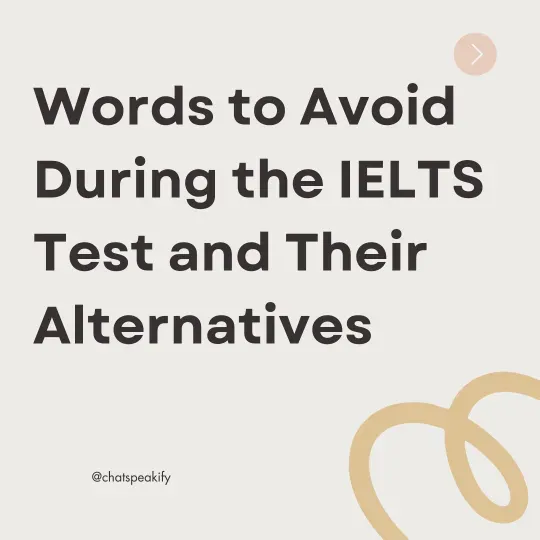Enhancing your vocabulary is crucial for success in the IELTS test. Using varied and precise language can significantly improve your score. Below are common words to avoid, suitable alternatives and examples to illustrate their use.
1. Very
Avoid: very good, very bad, very interesting
Use: excellent, terrible, fascinating
Example: The movie was excellent, with a compelling storyline and outstanding performances.
2. A Lot Of
Avoid: a lot of people, a lot of money
Use: numerous people, a significant amount of money
Example: Numerous people attended the concert, making it a huge success.
3. Things
Avoid: many things, good things
Use: many aspects, positive attributes
Example: She admired many aspects of his personality, especially his kindness and honesty.
4. Get
Avoid: get better, get worse, get a job
Use: improve, deteriorate, obtain employment
Example: His health began to improve after he started the new treatment.
5. Big
Avoid: big problem, big difference
Use: significant problem, substantial difference
Example: Climate change is a significant problem that requires immediate action.
6. Good
Avoid: good effect, good result
Use: beneficial effect, positive result
Example: Regular exercise has a beneficial effect on mental and physical health.
7. Important
Avoid: very important
Use: crucial, essential, pivotal
Example: Education is crucial for personal and professional development.
How to Implement These Alternatives in Your Writing
Using varied vocabulary not only makes your writing more interesting but also demonstrates your command of the English language. Here are a few tips on how to effectively incorporate these alternatives into your IELTS test responses:
-
Practice Regularly: Regularly write essays or responses using these alternative words. This will help you become more comfortable with them and ensure they come to mind easily during the test.
-
Read Widely: Read a variety of English materials, such as newspapers, magazines, and books. Pay attention to how authors use different words and phrases to express similar ideas.
-
Use a Thesaurus: When you find yourself repeatedly using the same word, look it up in a thesaurus to find alternatives. However, make sure you understand the nuances of the new words to use them correctly.
-
Expand Your Vocabulary: Make a list of common words you use frequently and find at least three alternatives for each. Practice using these alternatives in sentences.
-
Get Feedback: Have someone proficient in English review your writing and provide feedback on your use of vocabulary. This can help you identify areas for improvement and expand your word choices.
By avoiding overused words and using more precise alternatives, you can improve the quality of your responses and potentially increase your IELTS score. Remember to practice consistently and seek feedback to continuously enhance your vocabulary skills.
